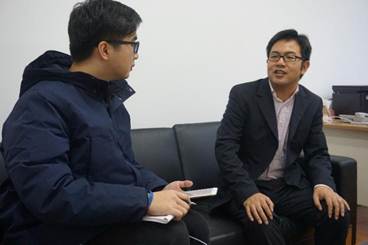Chai, a student from the School of Remote Sensing and Information Engineering, was asked about his impression of Prof. Fan after Fan’s speech about his experience of studying abroad in Germany. “Prof. Fan is definitely not the way others conceive a professor should be—not an amiable old man with a white beard, looking wise at first sight; and not a supremely talented person, however with odd character. Every single movement by Prof. Fan is just ordinary yet, somehow, this reflects his unique charisma.” Chai said, “Prof. Fan is a superstar, students in the School of RS admire him a lot.”
Perhaps Prof. Fan looks ordinary to some extent, but absolutely not academically. Recruited in the Young Overseas High-Level Talent Introduction Plan(also known as the Recruitment Program for Young Professionals) in 2017, Fan Hongchao is currently a professor and doctoral supervisor of the School of Remote Sensing and Information Engineering at Wuhan University. He received his B.S. degree in GIS from Wuhan University in 2000, his M.Sc. degree in Surveying and Geographic Information Science from the University of Stuttgart in 2007, and his PhD degree in Cartography from the Technical University of Munich in 2010. Before joining WHU, he worked for the department of geography at Heidelberg University in Germany from 2012 to 2017. He was the director of the Urban Modeling Research Team at the Institute of Geographic Information Science, and led his team to complete a series of scientific research projects. Prof. Fan has published more than 50 papers, including 21 SCI or SSCI papers, and has led and participated in many national research projects such as projects supported by the National Natural Science Foundation of China, DFG, etc. His current research concentrates on urban modeling, data mining, etc. He serves currently as Associate Editor of the Arabian Journal of GeoSciences.

Prof. Fan being interviewed
Q: Why did you choose to come back to China?
A: To be honest, coming back to China is not about building our motherland nor the rejuvenation of China. I don’t want to say those hollow words. It is basically because the domestic academic environment is better than that of Germany. In recent years, our country has stepped up efforts to develop the field of RS and geomatics. which provides much more opportunities for me to do scientific research. That’s why I came back to China.
Q: What are your suggestions to the students majoring in interdisciplines such as GIS?
A: It is quite vital to focus on learning math and physics well. GIS is an interdiscipline of geomatics and information science. Take the process of solving a GIS problem for example, we’ll have to set up mathematical models, and come across many questions of probability and statistics. Also, to truly understand how a system works requires knowledge in physics. A good foundation of math and physics usually helps you go further in this research field.
Q: Is there any difference in the atmosphere of academia between China and Germany?
A: Differences do exist, which is mainly due to cultural differences. Generally, according to my personal experience, doing research in China is more flexible. In Germany, however, academic work sticks strictly to the plan. Yet, neither is better or worse.
Q: What are your opinions and suggestions to the atmosphere of academia in Wuhan University?
A: Wuhan University is doing well in academia. What I hope is that maybe there could be more intersections among different subjects and disciplines, for there’s always a preferred angle to solve a problem for different disciplines. If there’s something like a forum for researchers from different disciplines to communicate with each other, it may promote the development of multidisciplinary and interdisciplinary research, as well as provide the researchers with brand new methods to break the barriers which originally seem difficult to overcome.
Q: How do you get over the difficulties you’ve come across in scientific research?
A: I believe the greatest problem for a researcher is when they can’t find any problems. Some doctoral students and master students would struggle in finding an opening for their research direction. My suggestion is to refer to literature more often so that new ideas shall turn up. A researcher is always facing various problems. When they finds no problem, that is the real problem.
Q: What’s your opinion about the recruitment of outstanding professionals (the talent introduction plan) done by Wuhan University currently?
A: Recruitment of experts will definitely boost the academic prowess of our school. And I think we should recruit more talented people overseas, to absorb new thoughts and ideas. Our school needs researchers of all fields, especially some emerging disciplines, not just traditionally fundamental disciplines.
Q: What do you usually do to relax yourself in your spare time?
A: I seldom do sports, but I walk to and from work. To be honest, there’s not much great pressure on me, at most I am a little busy. I just spend my time taking care of my family and having fun with my child. Sometimes I will chat with some familiar colleagues.
Q: What do you think is the most important quality that a researcher should acquire?
A: First of all, a researcher must be honest. Academic integrity is the precondition for one to make achievements in scientific research. Not only in the research field, but also in daily life, a man of integrity will receive approval from others. Also, scientific research requires perseverance. No matter what happens, stick to your goal and always be curious to the unsolved problems and the unknown fields. Find problems and solve them, then find new problems. That’s the mission of a researcher.
Photo by Chen Ziyao
Edited by Xu Yixian, Zheng Yayun, Edmund Wai Man Lai & Hu Sijia


